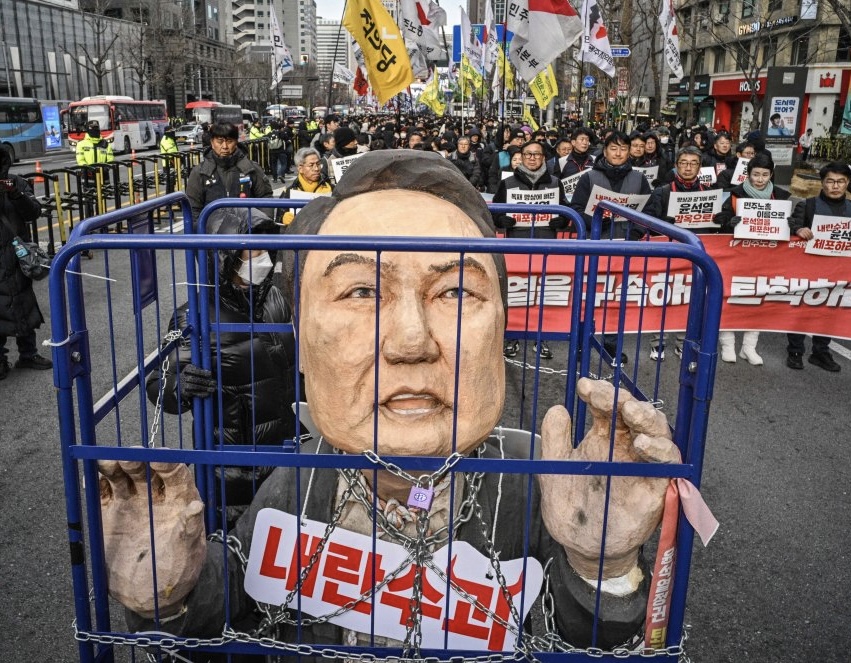Ball passes to Constitutional Court as Parliament votes Yoon impeachment
Today 204 MPs out of a total of 300 voted on the impeachment motion. There were 85 votes against, three MPs abstained and eight invalidated ballots. At least 12 members of the majority were in favour of the ouster. The constitutional judges (three out of nine are vacant) will have to approve the decision within 180 days. For experts and analysts ‘this is not the end of the turmoil’.
Seoul (AsiaNews) - Seoul's opposition-led parliament today voted to impeach South Korean President Yoon Suk Yeol following his attempt - which was overturned after a few hours - to impose martial law in the country on 3 December.
With the suspension of his powers and duties related to his office, according to the Constitution the role of interim president will be held by the current Prime Minister Han Duck-soo.
Now the ball passes to the Constitutional Court, whose process could take weeks if not months with a maximum time limit of six to decide: once the process has been investigated, the judges will have to approve (or reject) the decision of the deputies and, in the event of ratification, call for the election of a successor within 60 days.
The body consists of nine members and the vote must pass with a two-thirds majority; however, there are currently only six judges, while three are vacant and there is still no agreement between the majority and the opposition on the appointments, so a unanimous decision of the judges is required.
In the meantime, today's vote ‘freezes’ President Yoon's powers but does not relieve him from office, because only the approval of the Constitutional Court will fully implement the impeachment and lead to his ouster. In the only precedent of impeachment in South Korea, the judges took three months to remove Park Geun-hye in 2017.
In the past few days, the parliament first rejected the impeachment motion against the president, who had proclaimed (and then lifted) martial law. Following the vote, the opposition had accused the People Power Party (PPP)-led government of staging a ‘second coup d'état’. According to the Constitution, the president remains head of government and commander of the army unless he is incapacitated, resigns or relinquishes office.
Only in such cases can power be transferred - temporarily, until elections are held - to the prime minister. Experts agree that a president cannot delegate his authority while in office and the suspension of powers is only linked to impeachment.
This morning 204 MPs out of a total of 300 voted for the impeachment motion for the president, who together with his allies is under investigation on charges of insurrection and cannot travel abroad. This means that at least 12 deputies from Yoon's party sided with the oppositions.
There were 85 votes against, while three MPs abstained and eight ballots were invalidated. However, analysts and scholars including Leif-Eric Easley, a professor at Ewha University in Seoul, note that the parliamentary decision does not mark ‘the end of South Korea's political turmoil’. On the contrary, continues the expert quoted by the BBC, ‘it is not even the beginning of the end, which will involve the election of a new president’.
The Constitutional Court now has up to 180 days to decide whether President Yoon should be impeached or reinstated. If it decides on impeachment, elections for the next president will have to be called within 60 days of the ruling.
The leader of the main opposition party, the Democratic Party, Lee Jae-myung, who narrowly lost to Yoon in 2022, is favoured in the event of a new presidential election.
However, an appeal conviction and other criminal proceedings also hang over the opposition leader, which could lead to his exclusion from the country's highest institutional office. ‘So, before the final race in the polls, there will be a race in the courts,’ concluded the Seoul University lecturer.
In the immediate aftermath of the parliamentary vote, Yoon's supporters gathered in Gwanghwamun Square greeted the news in silence. Pastor Jun Kwang-hoon led the crowd in a chant: ‘Dismantle the ruling party’.
Some people uttered angrily charged insults and then left the venue. Addressing the nation, Yoon himself declared that he would ‘step aside’, while urging an end to the ‘politics of excess and confrontation’ and assuring that ‘the journey to the future... must never stop’.
The mood among opposition sympathisers was different, with thousands of people in the streets jubilantly welcoming a result that is nevertheless destined to exacerbate South Korea's political and institutional crisis.
11/08/2017 20:05







.png)










